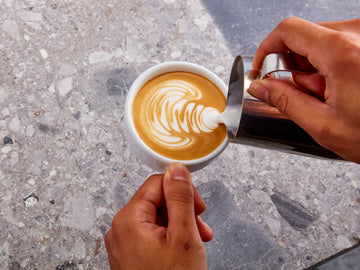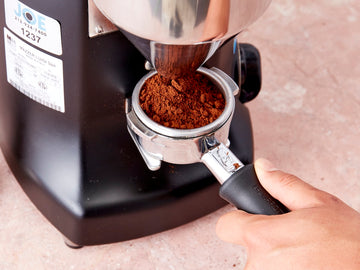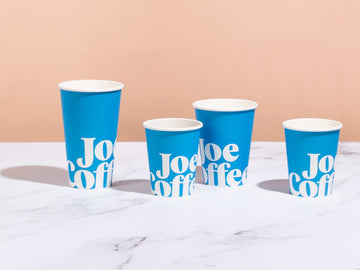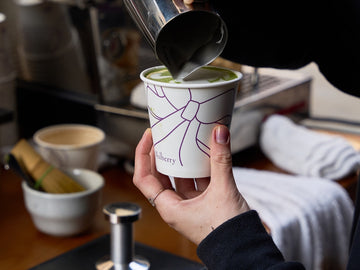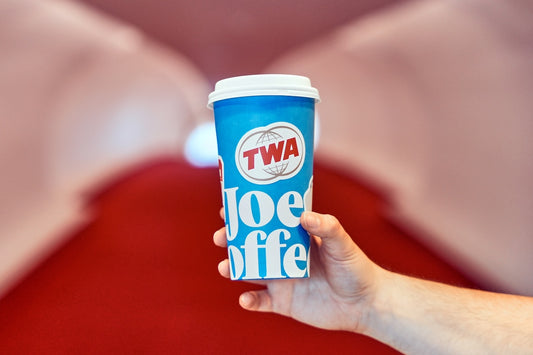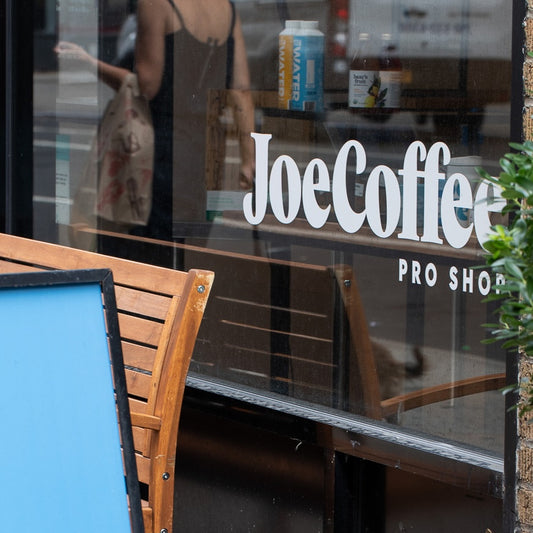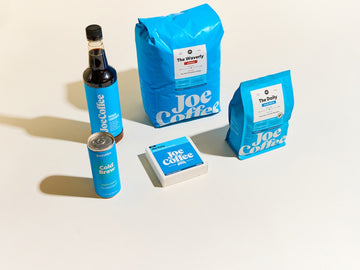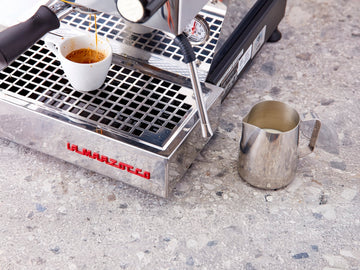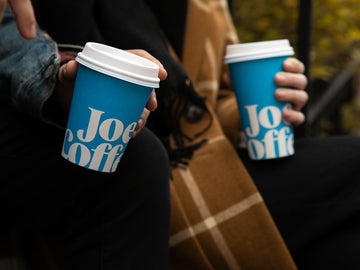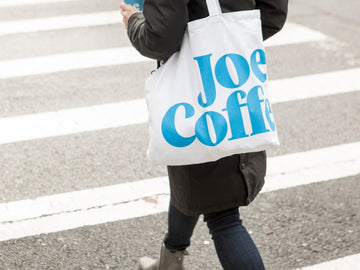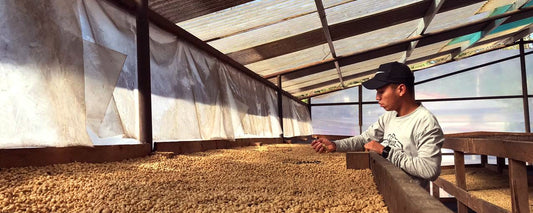Fincas Mierisch
Categories
All articles
Joe x Fincas Mierisch: A Chat with Amanda Byron
Inspired by our recent launch of The Mierisch Project Box Set, we took a trip down memory lane with Amanda Byron, Joe's first Director of Coffee, to learn more about the origins of our relationship with the Mierisch family. To explore these early beginnings, we would be remiss not to first introduce you to Amanda. Not only was Amanda Joe's first Director of Coffee, she was employee number one, helping our founder Jonathan Rubinstein open Waverly Place. In those early days of specialty coffee in New York City when latte art was still a novelty, Amanda was our go-to pourer of latte art, which meant that at first, our Waverly cafe hours were built entirely around her availability. During her 13 years at Joe, Amanda became a vital part of our growing company, touching nearly every part of the business, including getting our roasting operation off the ground in 2013. Our relationship with the Mierisch family, who is deeply intertwined in the Joe Coffee story, spans several countries and many years, but can be traced back to meeting Steve Mierisch in New York. We first met Steve when he worked in sales and customer service for our coffee provider at the time, Ecco Caffe (which later became Intelligentsia). Steve, whose family owns Fincas Mierisch in Nicaragua and Honduras, eventually went on to open the Pulley Collective, a shared roasting space at the Liberty Warehouse in Red Hook, Brooklyn. It was here in this 19th century waterfront warehouse, and thanks to Steve, that we got our start in roasting.[caption id="attachment_45316" align="alignnone" width="1280"] Pulley Collective[/caption]The Beginnings of Pulley Collective & Joe RoastingIn the days when we were purchasing coffee from Intelligentsia, Amanda often traveled to Chicago to visit their roastery. On one such trip, she can recall sitting in the booth of a dark bar with Steve and other folks from Intelligentsia when he told her about his idea to open a co-roasting space in New York. Although she'd never heard of such a thing before, she had a feeling it could be a good fit for Joe. Making the move to roasting our own coffee was something that had been at the back of Amanda and Jonathan's minds for some time." Once we got to a certain number of cafes, it just made sense to take production like this in-house," she explains. "I don't know how things would be if Joe didn't have that as a stepping stone."[caption id="attachment_45313" align="aligncenter" width="1280"] Amanda with Ed Kaufmann, Former Director of Sourcing, in 2014[/caption]From Pulley Collective to Sourcing From Fincas MierischOnce we got going at Pulley, it was only a matter of time before we began sourcing coffee from Fincas Mierisch and got to know the rest of the family. Although our first "Joe" coffee wasn't a Mierisch coffee (it was actually from our partner Wilmar Guarnizo), our sourcing relationship began soon after we began roasting all of our own coffee. Amanda recalls, "When we first started roasting, we only did 10% and the other 90% came from Intelly. But once we started roasting 100%, my guess is that a Mierisch coffee was on that menu very early on. It was also the first relationship we had where we traveled to the farm to select lots." When asked if she has any favorite memories from her sourcing trips to Nicaragua, Amanda says, "So many! I just remember thinking it was truly one of the most beautiful places I'd ever seen. I felt so lucky to be able to see the entire coffee process as it happened and to do that with the Mierisch family was really special. I loved riding in the back of the pickup truck, I loved the food (and the Flor de Cana!), I loved wandering through endless coffee trees and tasting coffee fruit. My understanding and love of coffee deepened and grew so much during those trips as did my relationships with the people who I got to travel with."[caption id="attachment_45314" align="alignnone" width="1280"] Amanda with Eleane Mierisch in 2014[/caption]Setting the Tone for Future PartnershipsVisiting the Mierisches in Nicaragua every year has become an integral part of who we are, and this foundation of friendship has truly set the tone for how we've evolved as buyers of green coffee. "There's a certain legitimacy of having real genuine relationships with the people who are producing your coffee. It takes you to a different level," Amanda says, "It not a 'direct trade' that's just for show." As we've grown and forged new partnerships around the world, we've held on to this as an important example of what a sourcing relationship can and should be. Importantly, as with any relationship, we believe that the value in our sourcing relationships must flow both ways. In this pandemic climate where coffee producers are shouldering an even greater share of the risk, it has been an opportunity for us to experience how we can share risk more equitably and a good reminder of how important it is to be honest business partners. That's why we were eager to collaborate with the Mierisch family on The Mierisch Project Box Set, to provide a sales outlet for this special trio of coffees which were grown, processed, imported, and roasted (at Pulley Collective!) entirely by the family. Shop and learn more about this collaboration here.[caption id="attachment_45345" align="aligncenter" width="1280"] On a sourcing trip in 2015[/caption]
Q&A with Fincas Mierisch
2020 has been a difficult year up and down the coffee supply stream. With demand on the decline, producers like our friends at Fincas Mierisch have had difficulties finding buyers for their high-quality, meticulously cared-for coffees. As roasters, we too have felt the constraints caused by the global health crisis, unable to be the good partners we have been in the past, but eager to help. This dynamic is what led us to collaborate on the release of the The Mierisch Project Box Set, a collection of three special coffees from the Mierisch family's farms in Honduras. As a vertically integrated business, Fincas Mierisch is responsible for producing, exporting, importing, and roasting this coffee. We're excited to be able to offer this incredible set directly to our customers—an effort to share risk with our friends and partners in an unprecedented time.On the heels of the release of this set, we took a moment to connect with Wingo Mierisch to hear how they've fared this year.Q: How has the pandemic affected you all personally?
A: The pandemic has been especially hard because we lost someone that was with Fincas Mierisch for over 50 years: Enrique Morraz. Losing him was like losing a family member. Our dear farm manager of our farms in Honduras passed away due to Covid in July.
Q: When did the worst of the pandemic hit Nicaragua, and what was the response from the community and local authorities?
A: May/June were the worst months for the pandemic in Nicaragua and Honduras as this was the time when hospitals reached full capacity. The Nicaraguan government initially didn’t take the virus very seriously, even claiming that it was just another strain of the flu so their response was really slow and inadequate. No restrictions or work closures were enforced in Nicaragua. Honduras had a better response, they closed their borders (essentially locking us out of Honduras since March) and restricted the days and where people could travel (also which business were allowed to stay open). However, these restrictions in Honduras did have a toll as many producers were not able to buy all necessary supplies to prepare for the next harvest and many had issues with coordinating exportation dates with the shipping lines that were working with minimal staff. In Honduras local authorities, such as the ones near our farms, restricted access in and out of the villages. Local authorities in Nicaragua were initially pretty relaxed but now there is an information campaign going on to inform and educate people on best practices to prevent the spread of Covid. Especially in Nicaragua, the brunt of the burden was taken on by individuals, communities, and private businesses to instill and follow safety protocols.
Q: Did you take on responsibility for your crew in ways that differed from the official/governmental response? How were your teams affected by all of that?
A: In Nicaragua we pretty much had to take full responsibility for our crew as the government response was inadequate and neglectful. We made sure to purchase and hand out masks and alcohol gel/spray to our entire team, enforced social distancing, created smaller crews/shifts, and we even have taken the extra step to hold meetings with our team and fellow producers to talk about best safety practices to prevent the spread of Covid. In Honduras, thankfully the government has been more helpful with their response so we do not have to take on as much responsibility with providing PPE, as the government was giving these out, but we still made sure to educate and try to enforce from afar the proper safety protocols. After the death of Don Enrique we paid out of pocket to get everyone at our farms in Honduras tested for the virus.
Q: Did you see a difference between the impact of the virus in Nicaragua and Honduras?
A: It’s difficult to tell exactly how Nicaragua was affected as the government hasn’t been releasing information (and the information it does release should be taken with a grain of salt). But from what we can tell Honduras, the country, was affected more probably because of the higher population and very densely populated major cities (Tegucigalpa and San Pedro Sula). Official death tolls in Honduras are much higher than the official death tolls in Nicaragua (but again, take the Nicaraguan death toll with a grain of salt).
Q: What are some of the long-term effects that you are experiencing now, ~9 months after the virus started to make waves in the world?
A: We’re noticing it’s definitely affecting everyone and every market. No one has escaped untouched. Early on this meant that many pre-orders were not fulfilled by our buyers and we were left with inventory very late into the season. In Nicaragua we just finished exporting our last container in September, we usually finish in June. For Honduras it meant we had to make a decision: leave the coffee in the country and run the risk of not making a significant return on the coffee, or take a chance and export it ourselves to the US to be sold spot. We went with the latter plan and it has fortunately worked out much better than expected and it led to this wonderful project we get to work with Joe Coffee.
Now, it’s just created uncertainty for both producers and buyers as no one knows how this pandemic will play out. As producers we worry that the market won’t be there to purchase our new harvest as we cannot afford another late season like last harvest. It will be all the more difficult as many buyers have already informed us that they will probably not be able to visit origin to purchase coffee. This will entail mailing out more samples than usual which does come at a considerable cost.
Q: Are there things you still need or still look for support for when it comes to safety during the pandemic?
A: I think we have mostly everything in place to continue preventing the spread of the virus in both countries, but educating people on the protocols that need to be taken and preventative measures will always continue to help.
Q: Were you able to participate in the Nicaragua Cup of Excellence (COE) this year since it wasn't cancelled due to Covid?
A: COE has not taken place yet but there are plans for it to go forward this year in Nicaragua and if it does, we will most likely participate. We are still unaware if COE will take place in Honduras which we hope it does.
Thank you both and Joe Coffee for your support on this project. With 2020 being a rough year for everyone we are super grateful and blessed to be working with you on this. It truly means a lot!
Q: How have you fared with the impact of Hurricanes Eta and Iota?
Honduras definitely took the largest hit from Eta, many casualties and damages, we were fortunate that no one from our team got harmed. The farms experienced mudslides and the dirt roads to and from the farm unusable but no real damage to the trees/harvest thankfully. We're extremely anxious to be able to go back, its been so long but I believe the borders are opening up soon. Nicaragua got a lot a rainfall, which damaged some small lots that were drying from the crazy flowering harvest, and the few ripe Laurina cherries that were there popped or fell to the ground (most likely got contaminated) but we still need to cup them first! We were very fortunate that no one was harmed but the Caribbean/Atlantic coast of Nicaragua was hit hard.
COE shared some really helpful links to donate to for Hurricane Eta.
https://www.gofundme.com/f/LSV-ETA-Relief-Fund
https://support.crs.org/donate/hurricane-eta


